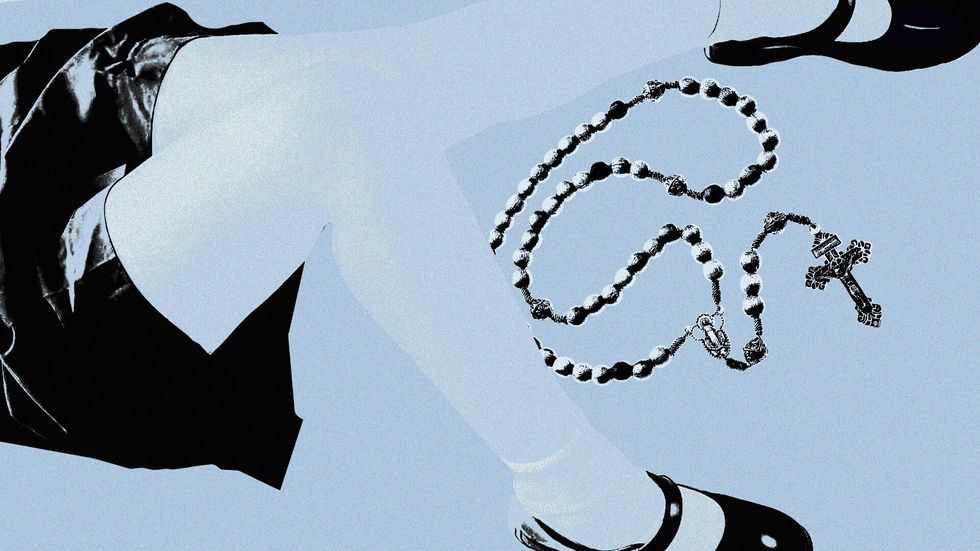[ad_1]

“It’s her finest album thus far. I can’t cease listening to it,” my associates raved upon the discharge of Lana Del Rey’s latest oeuvre Did You Know There’s a Tunnel Beneath Ocean Blvd—an album as verbose and meandering as its title would recommend. I fall beneath the laziest class of Lana fan; I’m not a die-hard fanatic, however I discover her pouty self-mythologizing and psychosexual devotion to America to be amusing. I discover myself replaying her albums greater than I’d wish to admit, and my Spotify Wrapped likes to slap me with that actuality test annually. Whether or not there’s a component of irony in her persona, we’ll by no means know for positive, however one factor is for certain—she is dedicated to the bit.
When the brand new album got here out, I cued it up for a drive throughout LA. The unmistakable Christian timbre of the opening traces of “The Grants” was not what I anticipated, however because the fourth monitor “A&W” busted out with the folk-trap refrain “jimmy jimmy cocoa puff,” I used to be assured we had been again to the “sexy unhappy” anthems we’ve come to anticipate. Virtually as if to punish me for lip-synching “American Whore” for seven minutes, the next monitor—“Judah Smith Interlude”— started with a sermon. A person shouts a fiery condemnation of lust with the fanfare of an evangelical preacher. I believed, “Okay, attention-grabbing intro”—I sat there, foolishly ready for a music to take form, however no. There I used to be, the spitting picture of my very own unironically Christian mom, by accident listening to a full-blown sermon in my Impreza. I knew Lana favored to fetishize Americana, however has she actually gone from “my pussy tastes like Pepsi cola” to megachurch sermons? For a fanbase of sexy, depressed ladies and homosexual males, the full-track sermon had me flummoxed.
Whereas the “Judah Smith Interlude” is definitely dismissed as a “skip” on the album, my subsequent Web-sleuthing left me with much more questions than solutions. Judah Smith’s brushes with homophobia raised applicable concern amongst her listeners. Lana’s die-hard followers analyzed the monitor with say-it-ain’t-so scrutiny and satisfied themselves that her occasional giggles through the recording had been a snide condemnation of the pastor’s phrases. With the opposite Christian overtones within the album and her penchant for problematic themes, I discovered myself doubting she would give a lot airtime to this specific model of refined irony. Lana hardly ever opts for subtlety.
For context, Judah Smith is a pastor at a Hollywood-based megachurch known as Churchome. After the rise and fall of superstar megachurch Hillsong, it seems that is the place the place Christian celebs like Justin Bieber, Selena Gomez, Kourtney Kardashian, and extra fled to for his or her occasional worship. Judah Smith appears like Christian Slater in skinny denims, and his model of non-denominational Christianity provides Churchome an unmistakable “our God is an superior God” power. It solely is smart that ex-Disney stars and culturally beige celebs like Hailey Bieber would flock to the sort of influencer pastor. With out ties to any historic model of Christianity, it’s a secure choice—the identical sort of obscure, American spiritualism of thanking “God and my supervisor” in a single breath at an awards ceremony.
Lana’s work has all the time idolized the perversions of American tradition—consumerism, Hollywood, intercourse, innocence misplaced and located—now she appears to be holding a mirror to America’s first spouse: Christianity. When you requested me to anticipate Lana’s non secular part a yr in the past, I might have predicted “hot-girl Catholicism” (I’ll clarify that additional later), however I’m realizing megachurch is definitely far nearer aligned together with her model. About 63 p.c of America is Christian, and almost 1 / 4 of that’s evangelical. Whereas not all megachurches are evangelical, they definitely make up the bulk. Sure, evangelicals are an extremely vocal part of America’s conservative celebration however—whereas enmeshed with politics—this isn’t the main focus of this argument. In distinction, I’ve actually solely taken discover of this cultural flirtation with Christianity as a result of it’s being adopted, or not less than consumed, by liberals. There’s no Gallup ballot of Lana stans, however I might say the vast majority of her fanbase is liberal and progressive. So are we liberals actually clutching our pearls about this megachurch sermon? In any case, she’s all the time had a penchant for American flags, weapons, and problematic opinions, however she’s simply being Lana, proper? It’s all a part of the bit – however has this actually all been a bit?
Lana apart, liberals appear to have a renewed fascination with Christian tradition. That is due, partially, to a resurgence of a phenomenon I wish to name “Sizzling Woman Catholicism.” Keep in mind the “Father Son Holy Spirit” bikini from Praying that went viral in 2021? With different merch sporting phrases like “God’s Favourite” and “Trophy Spouse,” I believed this was all pointing in the direction of the identical deadpan irony of most Web developments. Whether or not it’s “cool-girl-gone-quasi-Catholic” or the “cottagecore” TikTok development, there has all the time been the boomerang impact of the place seemingly “trad” turns into “alt.” The world of trend isn’t any stranger to Catholic imagery. Nicely-summarized within the 2018 MET exhibition “Heavenly Our bodies: Vogue and the Catholic Creativeness,” the opulence and pageantry of Catholicism have seduced many designers through the years. That is removed from new; the truth is, it’s a cyclical trend development—from Madonna’s “Like A Virgin” period within the 80s to Sarah Michelle Geller’s coke-spoon crucifix in Merciless Intentions circa 1999—scorching women and catholicism have all the time been a match made in irony-steeped heaven. What’s totally different about this specific resurgence in “scorching woman catholicism?” I can’t inform if it’s ironic anymore.
Each disaffected, progressive leftist, Wellbutrin girlie price their salt considers Dasha Nekrasova a family identify. Dubbed “sailor socialism” after a 2018 interview with an InfoWars reporter went viral, the actor/filmmaker grew to become a leftist “it woman” and co-host of the podcast Crimson Scare. The podcast is a bat sign for the “dirtbag left”—embracing vulgarity and edgelord humor to eschew Neo-liberal centrism—and is related to the subculture surrounding decrease Manhattan’s Dimes Sq.. For context, Dimes Sq. is just like the “cool youngsters” lunch desk within the Manhattan cafeteria. Why am I mentioning Dasha? This New York Magazine “it woman” has not too long ago reverted to Catholicism—unironically, she claims. With the political local weather surrounding abortion and LGBTQ rights, it’s an surprising selection for the podcaster, however it displays a bigger shift. The New York Occasions has written a number of items within the final two years in regards to the “Dimes Sq. Catholicism”. On a extra regarding be aware, in keeping with latest articles, the Crimson Scare’s socialism has now mutated into ideologies of the New Proper. The query stays—is all of it for shock worth? Is that this merely an edgelord transgression? Is it a “life as artwork” photocopy of Warhol’s personal inscrutable relationship with Catholicism? In a TikTok, Nekrasova says she continues to be navigating her personal relationship with Catholicism, saying, “David Foster Wallace talks about this in reference to AA, that it doesn’t actually matter in the event you’re doing one thing satirically as a result of it nonetheless works. It appears insane to go to mass ‘satirically,’ however in the event you go to mass, even in the event you don’t ‘imply it,’ issues will occur to you regardless.”
Whether or not Lana or Dasha are discovering their religion un-ironically or just “committing to the bit,” as artists are wont to do, youthful generations appear to be embracing religion with a brand new frequency. An article within the Wall Avenue Journal states that “about one-third of 18 to 25-year-olds say they imagine—greater than doubt—the existence of a better energy, up from about one-quarter in 2021.” This can be a shocking development contemplating the well-documented statistics that every new technology is much less non secular than the final. By surveys and anecdotes, some have come to the conclusion that, whereas not related to a selected non secular doctrine, there’s a higher need in youthful generations to hook up with a better energy. Why? Many are citing destabilizing elements of the Covid-19 pandemic to be the basis explanation for this resurgence in religion. The truth is, “47% extra younger persons are attending church because the pandemic.” Particularly for Gen-Z, that is the primary main trauma skilled of their lives and—very like generations returning to the church following the devastation of WWII—we’re all greedy for some semblance of that means and order.
This will likely even be the pure swing of the pendulum as our youngest technology was raised by predominantly nonreligious dad and mom. As fewer younger folks had been raised with the trimmings and trauma of a spiritual upbringing, spirituality has renewed intrigue. We’re residing in a time the place astrology, crystals, and “manifesting” have all gone mainstream. Once I was youthful, liberal dad and mom in San Francisco pooh-poohed the religious. Atheism was scorching. Something that wasn’t rooted in scientific reality was dismissed as ignorance. Now, twenty years later, this dismissive perspective and adherence to “proof” feels reductive and old style. Sure, all of us imagine in science however this technology embraces mysticism and post-modern ambiguity with a softer eye.
Raised with the Web, youthful generations can parse via info with unprecedented alacrity. They eat and eliminate developments with much less preciousness than any technology earlier than. There’s a “take what you want and go away the remaining” perspective in the case of ideology. As Dasha stated, “it doesn’t actually matter in the event you’re doing one thing satirically as a result of it nonetheless works.” Whereas there was a purity within the strict classes of 1’s id for Gen X and elder millennials—you’re a punk, jock, sq., and so on.—youthful generations skew in the direction of pastiche. A bit of bit ironic, a bit of bit honest—it doesn’t matter to them as a lot.
Sure, “Catholicism is a development” definitely makes for splashier headlines, as does “Lana Del Rey promotes a homophobic pastor.” It’s buzzy, it’s provocative, and it’s positive to drive up engagement within the remark part. However the reality could also be each extra difficult and fewer attention-grabbing. Some persons are resonating with themes of Catholicism. Lana Del Rey might discover elements of a sermon compelling. Not every part is an endorsement of an establishment in its totality. I feel the one “development” I’m seeing amongst youthful generations is a weariness in anticipating anyone establishment, celebration, or ethos to replicate all their private beliefs. Why should curiosity be adopted with dedication? So long as it isn’t hurting anybody, can we flirt with sure concepts and eliminate them as we please? Is that this non-monogamous strategy to that means a development or a mature dismissal of certainty? Perhaps, ultimately, the reply is that the “bit” doesn’t require as a lot dedication as we as soon as anticipated.
[ad_2]
Source_link



